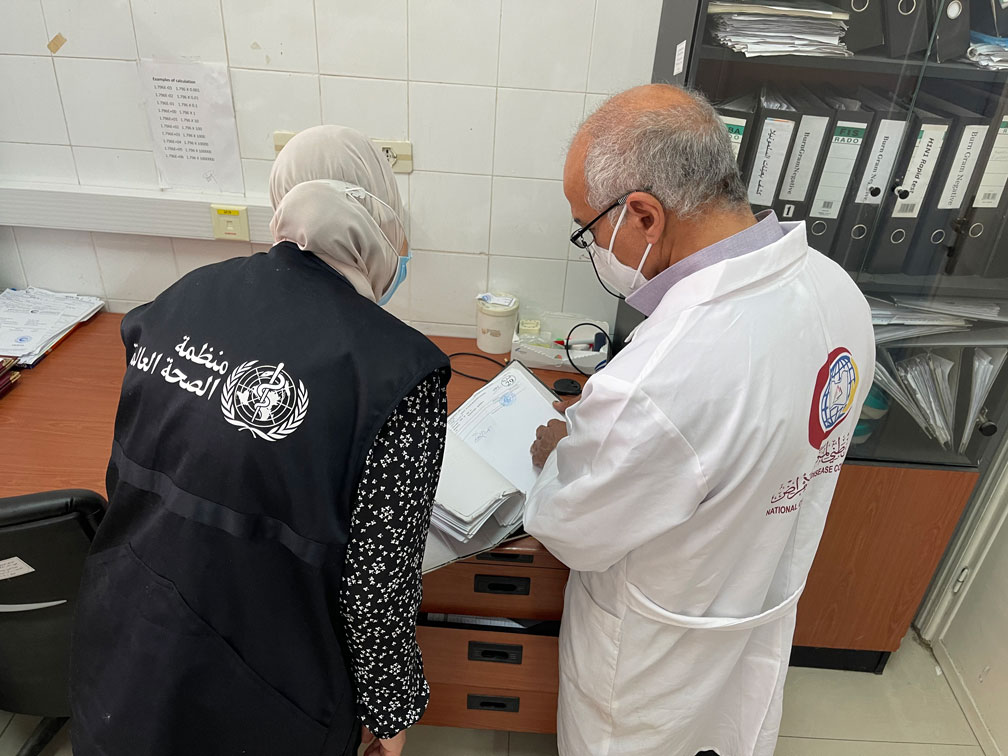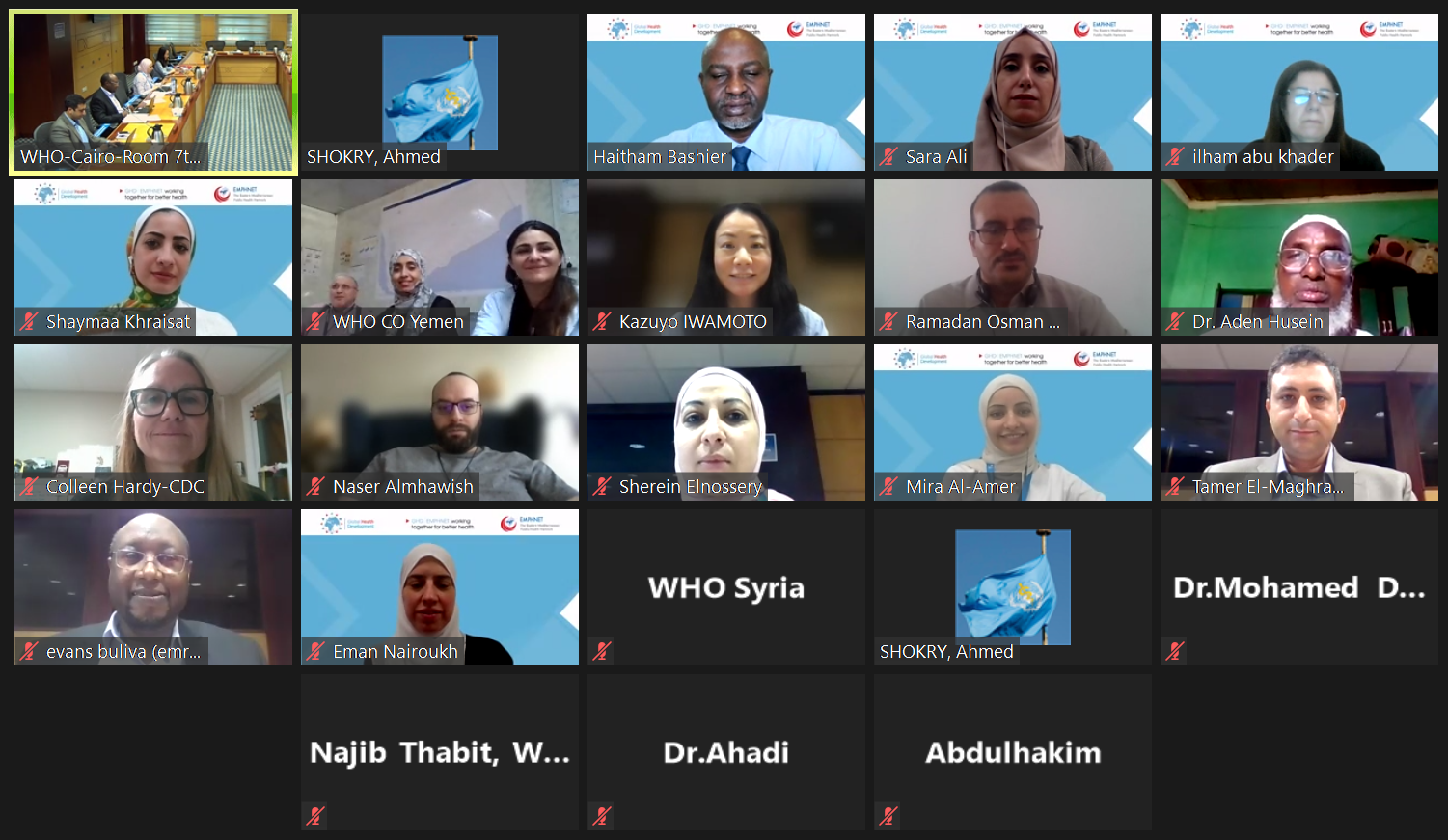
Cairo, 2 November 2021 – The capacities of frontline field workers need to be supported and developed to respond to outbreaks of epidemic- and pandemic-prone diseases effectively and efficiently, and their career paths need to be better defined and sustained by ministries of health and partners to retain their expertise.
This was one of the main outcomes of the annual meeting for the Early Warning Alert and Response Network (EWARN), which is being implemented in 8 countries of the WHO Eastern Mediterranean Region.
The 2-day virtual meeting held on 25–26 October discussed country-specific needs to build their frontline capacities and increase the pool of frontline workers who have the required knowledge and skills to respond to outbreaks in collaboration with partners. The theme of this year’s meeting focused on the introduction of a basic frontline field epidemiology training programme.
Ministry of health and WHO participants from Afghanistan, Djibouti, Iraq, Libya, Somalia, Syria and Yemen presented their activities and challenges during 2021 as related to surveillance and outbreak response, and their planned activities for 2022.
New tools being developed by the WHO Regional Office for the Eastern Mediterranean were presented to the participants, including an upcoming communications handbook on high-threat pathogens, the role of genomic sequencing in surveillance and outbreaks, and the proposed EWARN electronic platform. Results of the baseline survey on country level capacities, operations and outbreak response capabilities of rapid response teams (RRTs) were also discussed.
Sustaining frontline workers
 Participants from ministries of health, EMPHNET and US CDC took part in the annual WHO regional meeting.In order to better develop the capacities of frontline field workers to respond to disease outbreaks, WHO is working with partners to develop a sustained training programme that can be used at the country level. One such partnership was presented on the second day of the meeting during which EMPHNET, in collaboration with the United States Centers for Disease Control and Prevention (CDC), introduced their new Basic Field Epidemiology training package.
Participants from ministries of health, EMPHNET and US CDC took part in the annual WHO regional meeting.In order to better develop the capacities of frontline field workers to respond to disease outbreaks, WHO is working with partners to develop a sustained training programme that can be used at the country level. One such partnership was presented on the second day of the meeting during which EMPHNET, in collaboration with the United States Centers for Disease Control and Prevention (CDC), introduced their new Basic Field Epidemiology training package.
National and subnational outbreak response capacities were built by countries in the past with the support of WHO and partners, but the COVID-19 pandemic disrupted this work. Now WHO is looking towards building the capacities of frontline workers to ensure the sustainability of this expertise at the field level.
WHO will continue to support countries to conduct training needs assessment and will work with partners to implement frontline field epidemiological training programmes to cover surveillance and outbreak investigation. The programmes should be owned by ministries of health to achieve sustainability and ensure a stable career path for frontline workers.
EWARN connecting health partners
WHO’s EWARN surveillance system for emergencies is used to rapidly detect, verify and investigate any alerts or signals that might indicate unusual occurrences or unexpected increases of epidemic-prone diseases among emergency-affected populations and to timely respond to these events for containment.
EWARN systems connect health partners at surveillance reporting sites who collect and report surveillance data based on case definitions of select epidemic-prone diseases in order to trigger prompt public health interventions. EWARN is being used in both acute and protracted humanitarian crises where regular public health surveillance systems are underperforming, disrupted or non-existent.
A major component of EWARN systems operations is the function of responding to alerts and suspected outbreaks. This response capability has however been affected by limited logistic and operational resources, limited local RRT presence, and high response staff turnover among other factors. Moreover, the response function has been overstretched in the last 2 years during the COVID-19 pandemic.
There is a need to decentralize outbreak investigation and response activities and link them to the frontline health workers to increase local epidemiological capacities and ensure prompt response. Building the capacities of frontline health workers could be achieved by developing a standardized basic field epidemiology training programme to address dynamic public health challenges that keep arising while tackling high staff turnover.
Related links
WHO supporting evaluation of Libya’s EWARN system
Libya’s EWARN receives electronic boost from WHO
WHO supports countries transition from EWARN to routine surveillance
Updating the EWARN evaluation protocol for the Region
Evaluating Yemen’s disease surveillance and early warning system
Early Warning Alert and Response Network launched in Djibouti to detect epidemic-prone diseases
New EWARN Handbook to enhance quality of epidemiological surveillance in humanitarian emergencies




